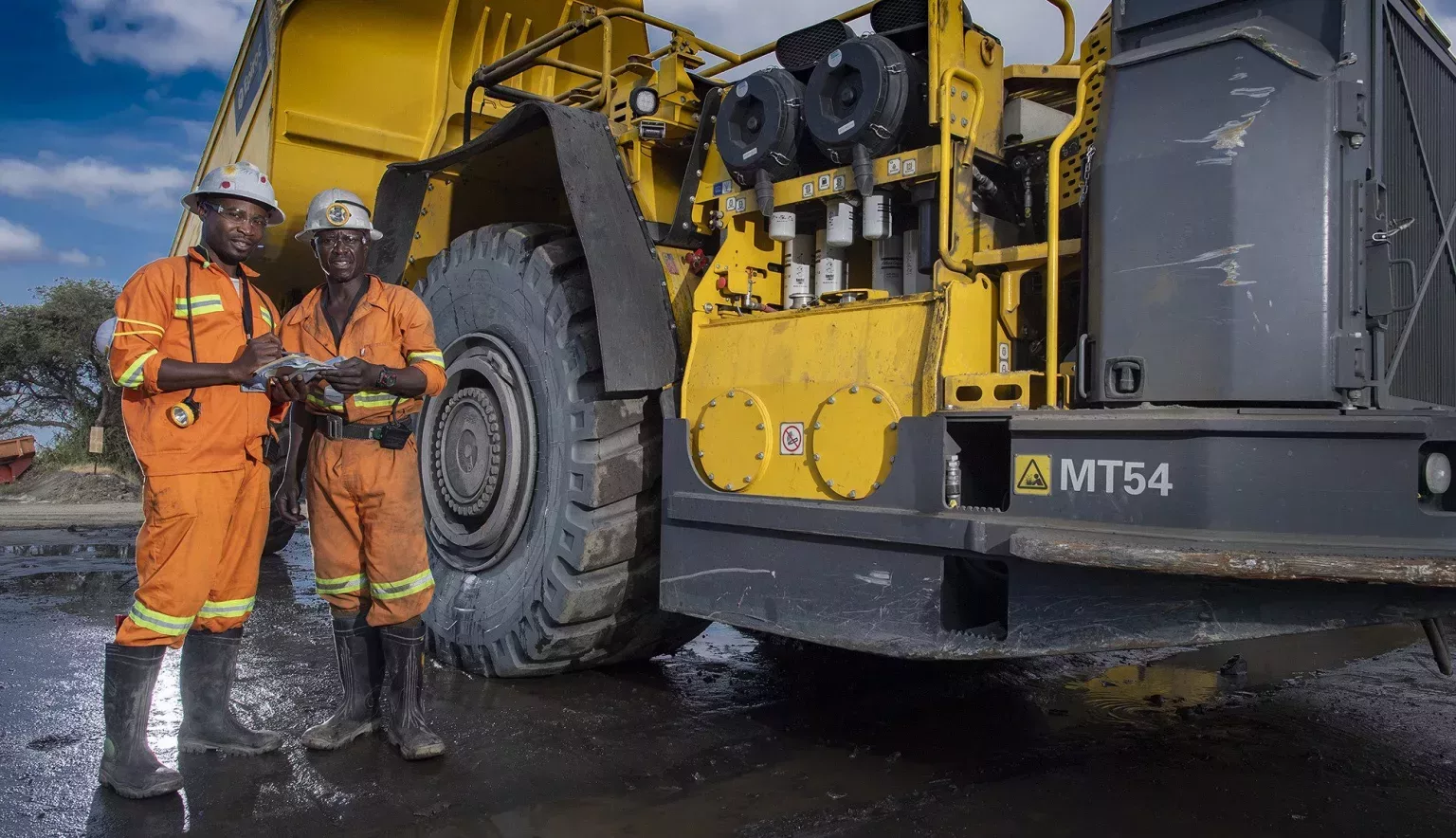Owed to extensive feasibility studies and continual investment, Mabiza Resources Ltd is edging ever closer to capitalising on the prize that is the Munali Nickel Mine.
A NOUS FOR NICKEL
“Zambia for a long time has been talking about diversification away from copper mining. It’s what we should be doing as a mineral rich country; the mines here have been in operation since the early 1900s and are now reaching exhaustion.
“It’s time to take a risk and plunge into something different, something more exciting.”
A career in mining wasn’t the original plan for Matthew Banda, the voice behind the opening statement.
Having been accepted by the University of Zambia to study engineering, chance had it that his roommate had opted for the same path and subject area but was honing his niche specifically for the mining sector. With 24-seven access to his roommate’s books, Banda quickly developed a keen interest in mining engineering, laying the foundations for an illustrious, prolonged career.
“That was 26 years ago now, and I can safely say that I have no regrets in selecting this vocation as my career of choice,” he affirms. “The journey has not been easy, but I have more than enjoyed the vast majority of it.”
The latter half of this quarter century has seen Banda remain stationed 80 kilometres south of the Zambian capital of Lusaka, initially having joined Albidion Zambia Limited (AZL) in 2007 as a senior engineer during the development of Munali Nickel Mine.
“I was part of the initial technical team to commence the green field development of the Munali Nickel Mine,” he reveals, “and I’ve been here ever since.”
The past 13 years have not been plain sailing, however. The site suffered two closures under AZL, the first as a result of the global financial crash in 2009 and the second caused by the then ongoing operational and commercial challenges.
In fact, fortunes only changed in 2014 when Mabiza Resources Limited, a subsidiary of Consolidate Nickel Mines (CNM), commenced operations in Zambia, taking up possession of the mine assets via an agreement with AZL and recruiting its employees, employees that included Banda himself.
“CNM and its partner investors saw an opportunity to turn around the struggling brown field mine,” Banda, now the company’s General Manager of the mine, explains. “Prior to placing significant investment into the project, an extensive feasibility study was commissioned to look at how the operation could be turned around.
“It was imperative to take the necessary precautions, identify what went wrong and reassess what would be done differently going forward regardless of fluctuating and low nickel prices.”
Having unearthed positive results during this undertaking, Mabiza invested significantly and has begun to bring the mine back to life ever since.
THE PROSPECTS AND POTENTIAL
So, what did this feasibility study uncover?
The simple answer, according to Mabiza, Banda and co, is the commercial potential of the project. The research revealed that the Munali mine is expected to produce around 4,500 tonnes per annum of 10-12 percent in concentrate nickel over a seven to 10-year life of mine, minerals that are ideal for both local Southern African and international smelters.
In addition, the facility had already been fully developed, remained dewatered and houses an operational crush, mill, float plant with a capacity of 900,000 tonnes per annum. The surrounding infrastructure equally followed this trend, with sealed road access, power from the Kafue dam hydroelectric system and a rail siding 20 kilometres from the site with connections to Durban, South Africa and other regions all benefitting the mine.
Looking at the bigger picture, nickel is also being hailed as a mineral of the future. Having long been widely used in batteries, its ability to deliver high energy density and major storage capacities at low costs have seen it being broadly touted as one of the key ingredients in electric vehicles, solar panels and other progressive technologies.
“The operation that has been set up is highly mechanised and is one of a kind in Zambia,” Banda adds. “Further, electric vehicles are here to stay and changes in battery technology makes it even more exciting to venture into nickel production.”
The past four years in particular have been momentous for the mine, Mabiza Resources having placed its own progressive, modernised stamp on the site, making significant changes to the modus operandi such as a shift away from some conventional mining methods and practices.
Banda continues: “This included the introduction of a variation of the avoca mining method, where backfilling the extracted stopes was proposed as opposed to open stopping mining. This has allowed for better cost control, safety, efficiency of operation, sustainable mine development and full exploitation and extraction of the resources.
Meanwhile, the government and surrounding community have consistently offered their support and backing to the revitalisation of the project, an element that has encouraged investors to partake and propelled the mine forwards.
INTERVENTION, INVESTMENT, INNOVATION
The redevelopment of the Munali Nickel Mine has kept pace as a result, and although Banda is quick to admit that the project has suffered some teething problems, overall there has been progress and the future looks bright.
“It’s at different stages from department to department,” he explains. “Some are ramping up production activities while others have stabilised and are now identifying opportunity for optimisation. What I can reveal, however, is that we’re on track to have all operations across all business functions stabilised within a few months.”
Optimisation is not the only area that has captured the Mabiza team at the moment, however. The company has equally invested in new processes including the dense media separation plant at the front end of the concentrator facility and a new PGM stream for the production of a separate PGM concentrate.
“In total we’ve spent in excess of $50 million on new machinery, technology and refurbishments thanks to the investments that we have received,” reveals Banda, further eluding to the implementation of Zambia’s dense media separation (DMS) plant as a flagship facility.
“This introduction of the DMS on the processing side was a game changer. The DMS plant essentially improves feed grade from one percent to two percent by the mechanical separation of waste rock before feeding it to the mills for further processing by taking advantage of differences in densities between the waste rock and ore.
“This technology is largely used in gold processing or in mineral types that have significant density differences in comparison to the host rock. In our case, it will serve to discard a significant amount of waste which would have required a large quantity of reagents to process the nickel, thereby helping in reducing our processing cost.”
Technological investments like the DMS plant have been a running theme throughout Mabiza’s recent activities at the Munali Nickel Mine, the company also having made forward-thinking process changes to the underground mining method and invested into a platinum group metal (PGM) concentrate circuit.
“As a result,” Banda continues, “we are now able to produce two saleable products in nickel concentrate and PGM concentrate, which was previously not the case.
“We’ve worked to reduce our cost of production to the extent that we should be able to operate at low nickel prices without compromising efficiency and productivity, and have made our employees accountable with the introduction of key performance indicators at every level being visible electronically to management.
“A fully-fledged procurement and supply department have also been introduced to this end, ensuring we get the best value for money. There are a lot of new interventions – these examples are pointers to just some of the key initiatives.”
AN EYE TO THE FUTURE
To say that Mabiza Resources is content with the progress that it has made to date, however, would be false.
While a significant number of updates have been made via the aforementioned investments, Banda recognises that further strides need to be taken to ensure that the operation becomes fully optimised, efficient and successful.
“The Munali site is the only nickel mine in Zambia which is taking an innovative and progressive approach to its operations,” he states. “Many of the people who have visited us of late have said we’re in line with international standards, but there is still room for improvement in many aspects.”
Right now, the overriding goal is to make the nickel mine profitable. However, once this has been achieved, ambitions are already in place to take the site to the next step.
Banda continues: “Continued exploration is certainly on the cards for the future – we believe we can increase the life of mine from seven years to 10 or even 15 years with initial exploration, and further ventures could add even more reserves.
Further to this, Mabiza Resources is hoping to bolster the mine’s on-site processing capabilities, investments that would allow the production of nickel metal and/or nickel sulphate as the final product as opposed to nickel concentrate.
“We also plan to construct a solar plant on site to compliment electric power from the national grid,” adds Banda, “but this will be further down the line.”
SOCIOECONOMIC STALWART
The company’s expenditures, while largely geared towards capitalising on this prosperous commercial potential, are not limited to the mine itself, however.
The company spends great amounts of time and money on aiding the surrounding communities alongside its on-site development through an ever-growing list of social investment programmes.
“Yes, we are very much active when it comes to CSR,” Banda responds when questioned about the company’s practices. “Our model on this front is focused on three thematic areas – education, health and agriculture.
“We see these as the key to having a major, positive impact on communities.”
The former of the three focus areas has seen Mabiza construct a 650-pupil capacity school that currently provides both primary and secondary education services, fitted with modern learning aids in the form of tablets that hold the entire primary school curriculum in seven different local languages.
On the healthcare front, the company has also helped to almost eradicate malaria in the local area. Banda reveals: “We are involved in indoor residual spraying for malaria covering a radius of 20 kilometres from the mine where we work together with the Mazabuka District Malaria Task Force to protect over 150,000 people annually, and have built a clinic that tends to an average of over 600 outpatients every month.
“Our agricultural efforts meanwhile are geared towards assisting farmers in adopting conservation methods and linking them with markets for their produce.”
Arguably one of the company’s most substantial social stimulation efforts, however, stems from its work with the Musangu Foundation – a UK social enterprise initiative created to provide new solutions to industry development, social and environmental issues in mining communities.
“The foundation has been working with mining houses and other stakeholders to develop livelihood restoration programmes and allow mining areas to be resilient beyond their finite mine life,” Banda explains. “At national level, it has created Impact Capital Africa, a platform that identifies and prepares small and medium enterprises before linking them to impactful investors.”
Active on all fronts, these schemes demonstrate that Mabiza is not only set to have a profound impact on the local community by removing its heavy economic reliance upon agriculture, but equally through the creation of opportunities and improvement of living standards through these wider methods.
“These are mere highlights of what we do in regard to CSR,” adds Banda.
STRIKING GOLD
Employment is another area where Mabiza is championing the region’s socioeconomic strives, with 99 percent of the company’s staff being Zambian nationals.
“It’s something that we’re proud of,” Banda states. “Experts only come in to assist in areas that we have identified skills shortages, but otherwise we’re focused on providing local people with abundant opportunities in this sector.”
These opportunities, unsurprisingly, have been snapped up. At the restart of operations, the company attracted both swathes of local and international talent, owed to the firm benchmarking its offerings against global industry standards to ensure that they are competitive.
“It’s a goal of ours at Mabiza to be renowned as an employer of choice, responding to the needs and aspirations of our employees,” Banda affirms. “To facilitate ease and flexibility of work, we have deliberately engaged technically competent personnel at artisan level to work as operators.”
With this capable, sizable team at the helm that is expected to expand to 400 full time workers at full capacity, the GM remains confident that Mabiza will execute its ambitions effectively moving forward.
“Phase one will lead to the production of nickel concentrate and PGM concentrate; phase two will either involve the production of nickel metal on site through electrowinning or beneficiating the material to sulphate depending on the market; and phase three will see expanded exploration works,” Banda reveals.
This won’t be without its challenges, however.
The Zambian mining industry has continued to struggle with stable mining legislation after a series of frequent, sporadic changes made it difficult for investors to plan for future projects.
“This is ultimately beyond our control,” admits Banda, “but we hope the government will heed to our plight that we have highlighted at every opportunity. Stability will provide more confidence, and confidence will allow investment to flow.”
Expressing these concerns both directly to the government and through the Zambia Chamber of Mines, Banda remains both hopeful and optimistic that the horizon remains prosperous with the Munali Nickel Mine in capable hands.
He concludes: “Having gone down twice, the mine has been given one more lease of life that must not be squandered. We have embarked on an exciting journey for the local community, the country and the investors.
“As stakeholders we are confident that we shall achieve a good outcome, but we need to be in a position of applying our various talents in unison in order to win as only the best is good enough.”
































